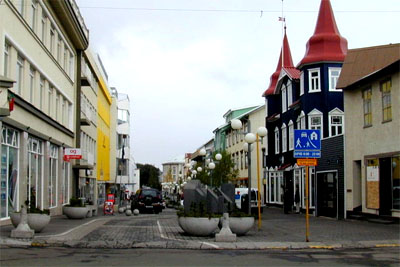ADVERTISEMENT
|
|
|
NextGen Day Europe - Iceland Destination
Economy of Iceland
NextGen Day offers travel tips and information for top travel places and best destinations in Africa, Asia, Australia, Europe, Middle East and United States of America. We feature Africa links, Africa resources and large selection of Africa budget airlines, Africa chartered planes, Africa sea cruises, Africa ferries, Africa travel agencies, Africa land transports and Africa attractions including Africa beaches, Africa medical tourism, Africa retirement homes, Africa historical and Africa pilgrimage tours.
 Akureyri is the largest town in Iceland outside of the greater Reykjavík area. Most rural towns are based
Akureyri is the largest town in Iceland outside of the greater Reykjavík area. Most rural towns are based
on the fishing industry, which provides 40% of Iceland's exports.
Iceland was the fourth most productive country in the world by nominal gross domestic product per capita (54,858 USD), and the fifth most productive by GDP at purchasing power parity (40,112 USD). Except for its abundant hydro-electric and geothermal power, Iceland lacks natural resources; historically its economy depended heavily on the fishing industry, which still provides almost 40% of export earnings and employs 8% of the work force. The economy is vulnerable to declining fish stocks and drops in world prices for its main material exports: fish and fish products, aluminium, and ferrosilicon. Whaling in Iceland has been historically significant. Although the Icelandic economy still relies heavily on fishing, its importance is diminishing as the travel industry and other service, technology and various other industries grow. Economic growth slowed from 2000 to 2002, but the economy expanded by 4.3% in 2003 and 6.2% in 2004. The unemployment rate of ~1.0% (2007 est.) was among the lowest in the European Economic Area.
Although Iceland is a highly developed country, it is still one of the most newly-industrialised in Europe. Until the 20th century, it was among the poorest countries in Western Europe. The strong economic growth that Iceland has experienced in recent decades has only just allowed for the modernisation of infrastructure. The government coalition plans to continue its generally neo-liberal policies of reducing the budget and current account deficits, limiting foreign borrowing, containing inflation, revising agricultural and fishing policies, diversifying the economy, and privatising state-owned industries. The government remains opposed to EU membership, primarily due to Icelanders' concern about losing control over fishing resources.
Iceland's economy has been diversifying into manufacturing and service industries in the last decade, including software production, biotechnology, and financial services. The tourism sector is expanding, with the recent trends in ecotourism and whale-watching. Iceland's agriculture industry consists mainly of potatoes, green vegetables, mutton and dairy products. The financial centre is Borgartún in Reykjavik, hosting a large number of companies and three investment banks. Iceland's stock market, the Iceland Stock Exchange (ISE), was established in 1985. The three investments banks collapsed in October 2008 taking down the entire financial sector, stock market, and currency with it.
The national currency of Iceland is the Icelandic Króna (ISK). Iceland's then foreign minister Valgerður Sverrisdóttir said in an interview on 15 January, 2007 that she seriously wished to look into whether Iceland can join the Euro without being a member of the EU. She believes it is difficult to maintain an independent currency in a small economy on the open European market. An extensive poll, released on 11 September, 2007, by Capacent Gallup showed that 53% of respondents were in favour of adopting the euro, 37% opposed and 10% undecided.
Iceland ranked 5th in the Index of Economic Freedom 2006 and 14th in 2008. Iceland has a flat tax system. The main personal income tax rate is a flat 22.75 percent and combined with municipal taxes the total tax rate is not more than 35.72%, and there are many deductions. The corporate tax rate is a flat 18 percent, one of the lowest in the world. Other taxes include a value-added tax and a net wealth tax. Employment regulations are relatively flexible. Property rights are strong and Iceland is one of the few countries where they are applied to fishery management. Taxpayers pay various subsidies to each other, similar to European countries with welfare state, but the spending is less than in most European countries. Despite low tax rates, overall taxation and consumption is still much higher than countries such as Ireland. According to OECD, agricultural support is the highest among OECD countries and an impediment to structural change. Also, health care and education spending have relatively poor return by OECD measures. OECD Economic survey of Iceland 2008 highlighted Iceland's challenges in currency and macroeconomic policy. There was a currency crisis that started in the spring of 2008 and on 6 October trading in Iceland's banks was suspended as the government battled to save the economy.
Iceland was ranked first in the United Nations' Human Development Index report for 2007/2008. Icelanders are the second longest-living nation with a life expectancy at birth of 81.8 years. The Gini coefficient ranks Iceland as one of the most egalitarian countries in the world.
Source: Wikipedia Encyclopedia
Iceland Hotels
<1> <2> |

